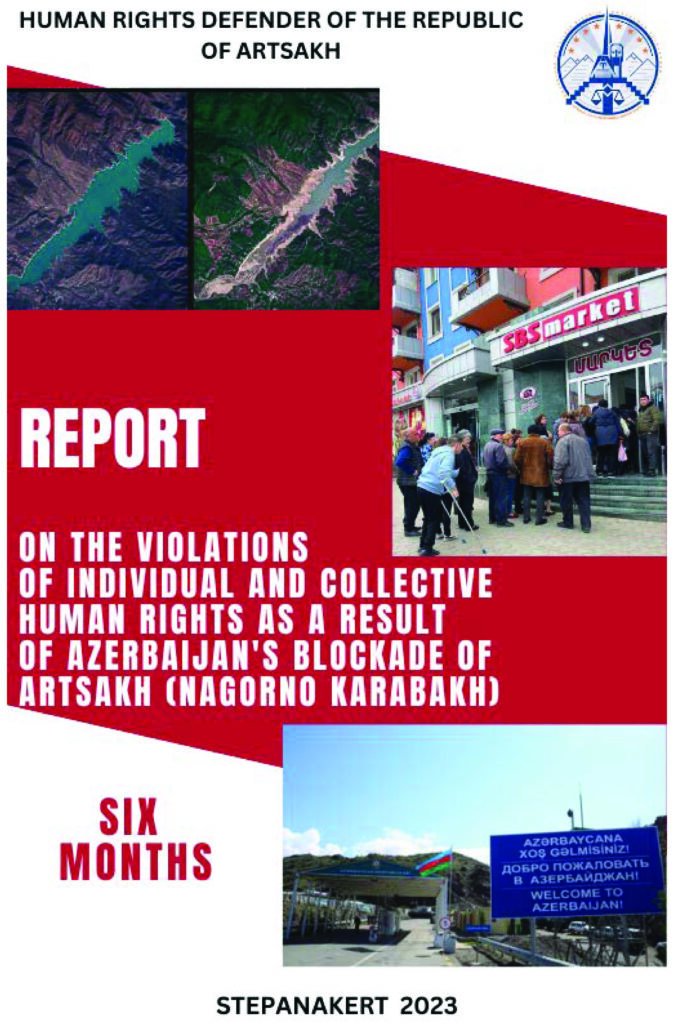As I write this, I find myself in complete disbelief that it has come to the point where talking about this has become our reality. June 12 was the six-month mark of the Artsakh blockade. Unbelievable. This is yet another chapter in the Armenian story stained with sorrow and unimaginable hardship. Just like that, six months have passed, and simultaneously, it feels like time has stopped and our people are caught in the eye of a hurricane.
 On June 13, the Human Rights Defender of the Republic of Artsakh issued an updated ad hoc trilingual report entitled “On the Violations of Individual and Collective Human Rights as a Result of Azerbaijan’s Blockade of Artsakh (Nagorno-Karabakh),” comprehensively detailing the violations of seven individual rights, five rights of vulnerable groups and four collective group violations. The findings indicate the true scope of the people of Artsakh’s pain and suffering, exhibiting the rapidly escalating humanitarian crisis and the genocidal policies perpetrated by brothers-in-arms Azerbaijan and Turkey.
On June 13, the Human Rights Defender of the Republic of Artsakh issued an updated ad hoc trilingual report entitled “On the Violations of Individual and Collective Human Rights as a Result of Azerbaijan’s Blockade of Artsakh (Nagorno-Karabakh),” comprehensively detailing the violations of seven individual rights, five rights of vulnerable groups and four collective group violations. The findings indicate the true scope of the people of Artsakh’s pain and suffering, exhibiting the rapidly escalating humanitarian crisis and the genocidal policies perpetrated by brothers-in-arms Azerbaijan and Turkey.
Key data from the report on human rights violations during the 182-day blockade include:
- The movement of people along the Stepanakert-Goris highway (Lachin Corridor) has declined by approximately 198 times, with only 2,246 arrivals and departures, as opposed to the anticipated 445,900.
- Automobile traffic on the road has decreased roughly 58 times, with only 2,867 car entries and departures facilitated by the Red Cross and Russian peacekeepers, as opposed to the anticipated 167,440.
- Essential cargo imports have been reduced by roughly 13 times, with only 5,574 tons imported as opposed to the expected 72,800 tons.
- Due to the suspension of pre-planned operations, about 1,400 citizens have been unable to undergo necessary surgeries.
- Azerbaijan has cut off the gas supply from Armenia to Artsakh for a total of 117 days, resulting in significant difficulties and hardships.
- The electricity supply from Armenia to Artsakh has been entirely cut for 154 days, leading to rolling blackouts and multiple accidents.
- An estimated 11,000 individuals, including cases of job retention, have lost their sources of income.
- The country’s economy has sustained losses amounting to approximately 346 million USD.
- Vulnerable groups, which include 30,000 children, 9,000 people with disabilities, 20,000 elderly people, 60,000 women and girls, and 15,000 displaced people, have been subjected to increased human rights breaches.
These statistics are grim and heart-wrenching, and difficult to recognize as something more than numbers on a screen or the pages of a newspaper. These are actual lives affected, lives lost, lives who for six months have not felt comfort or peace. Thinking about it like that removes the veil of comfort and makes you realize that each number is one of our brothers or sisters.
Azerbaijan has frequently and repeatedly violated the terms specified in the November 9, 2020 tripartite statement and the International Court of Justice (ICJ) judgment governing unimpeded passage along the Lachin (Berdzor) Corridor. Azerbaijan’s lack of respect for international norms and values is demonstrated further by its violent actions and the subsequent anguish of Artsakh’s citizens. The Azerbaijani government has illegally built a roadblock at the Hakari bridge since April 23 – one day before the anniversary of the Armenian Genocide, a clear message – and thus, exacerbated the already worsening situation. The international community not only has the right, but also a duty, to swiftly carry out the International Court of Justice’s ruling if it has any intention of preventing future Azerbaijani atrocities and crimes against humanity.
Azerbaijan’s systematic and consistent policy of ethnic cleansing, as witnessed during the 2020 Artsakh War and events following the implementation of the ceasefire, unambiguously suggests that any kind of recognition of Artsakh is associated with genocide. As a result, the right to self-determination for Artsakh has become linked to the right to live in their ancestral homeland.
Now is the time to stand up. It can feel hopeless helping from the Diaspora, but I can assure you our efforts are not in vain. First and foremost, I urge everyone to read the report. Then, immediately after, do this:
Right now, ranking democrat on the House Appropriations Subcommittee on Foreign Operation Rep. Barbara Lee (D-CA) is rallying her Congressional colleagues to cosign a letter to Secretary of State Antony Blinken to enforce Section 907 sanctions on US assistance to Azerbaijan. Call and tweet your US Representative to co-sign the Lee Letter – ringing alarms over Azerbaijan’s six-month-long blockade of Artsakh and urgently calling on President Biden to stop aiding and abetting President Aliyev’s anti-Armenian aggression with US tax dollars.
Artsakh’s right to self-determination – a fundamental principle embedded in international law – is not up for debate. Armenians know that this is existential, and we refuse to be overcome by dejection.



Be the first to comment